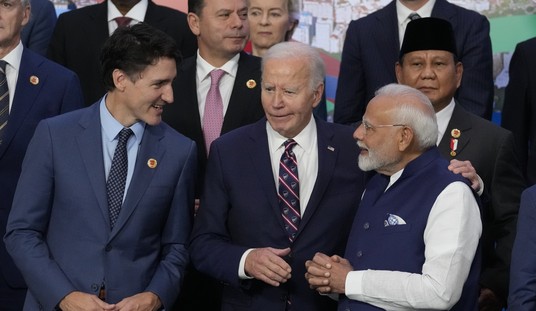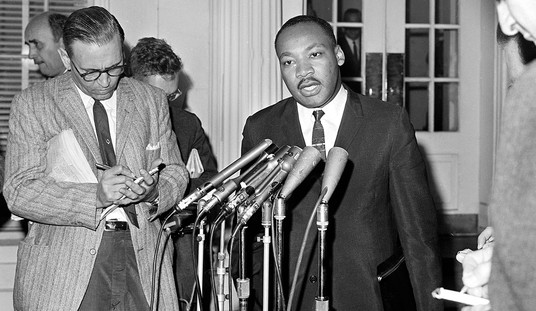Yesterday, Iran accused the US of lying about the terms of the deal on nuclear proliferation announced over the weekend, which produced this lament by John Hinderaker at Power Line: “One yearns for the good old days when, if there was a conflict between the U.S. government and Iran’s mullahs, you could assume it was the American government that was telling the truth.” Now it appears that the White House and State Department may have not been entirely honest about whether we actually have an agreement or not. The Times of Israel reports that the back and forth between Iran and the US forced the State Department to acknowledge that “technical details” have not been concluded — and that the agreement hasn’t gone into force yet:
Iran is currently enjoying a “window” of time before the six-month deal signed in Geneva early Sunday goes into effect, during which it is not bound to take any credible steps toward disabling its ability to produce a nuclear weapon, the State Department acknowledged Tuesday.
State Department spokeswoman Jen Psaki said that the six-month interim period, during which Iran would take steps to rein in its nuclear program in exchange for sanctions relief, has not yet begun. Furthermore, there are still a number of details to be worked out, she said, without specifying what points had yet to be finalized.
Her comments created confusion as to whether the much-touted interim deal, supposedly reached by P5+1 powers and Iran in Geneva in the early hours of Sunday morning, had actually been completed as claimed. Iran on Tuesday accused the US of publishing an inaccurate account of what had been agreed. And its Foreign Minister Mohammad Javad Zarif said in an address to the Iranian parliament Wednesday that Iran would continue construction on the Arak heavy water plant, in an apparent breach of the ostensibly agreed terms.
“The next step here is a continuation of technical discussions at a working level so that we can essentially tee up the implementation of the agreement,” Psaki told reporters Tuesday. “Obviously, once that’s — those technical discussions are worked through, I guess the clock would start. Obviously, there’ll also be a reconvening of the political track with the P5+1, which Under Secretary Sherman will continue to be our lead negotiator on.”
So when does the clock start on the non-deal deal? Psaki says no one knows:
Psaki said that she did not “have a specific timeline” for how long the window would be in place before the six-month period began, nor did there seem to be any mechanism in place to prevent Iran from stepping up nuclear production before the scale-down went into effect.
A disagreement on the Arak plant is hardly a “technical detail.” It was the most significant part of the issues that supposedly got addressed — a sticking point that led France to balk at an earlier push by the Obama administration to settle the dispute in the P5+1 talks. If Iran plunges forward on its plans to build a heavy-water facility, then one has to wonder what exactly the West got out of the negotiations except a piece of paper. Also, since the argument for the deal from John Kerry and Barack Obama is that the pact forces Iran to slow down its pursuit of nuclear weapons before it achieves that capability, one has to wonder why the clock hasn’t already started — and why the White House didn’t wait until it had before announcing the agreement.
One answer to that question is found in the latest Reuters survey on the deal. With Obama and his administration getting pounded in the polls, Obama needed some good news:
Americans back a newly brokered nuclear deal with Iran by a 2-to-1 margin and are very wary of the United States resorting to military action against Tehran even if the historic diplomatic effort falls through, a Reuters/Ipsos poll showed on Tuesday.
The findings were rare good news in the polls for President Barack Obama, whose approval ratings have dropped in recent weeks because of the botched rollout of his signature healthcare reform law.
According to the Reuters/Ipsos survey, 44 percent of Americans support the interim deal reached between Iran and six world powers in Geneva last weekend, and 22 percent oppose it.
While indicating little trust among Americans toward Iranian intentions, the survey also underscored a strong desire to avoid new U.S. military entanglements after long, costly wars in Iraq and Afghanistan.
Even if the Iran deal fails, 49 percent want the United States to then increase sanctions and 31 percent think it should launch further diplomacy. But only 20 percent want U.S. military force to be used against Iran.
A 44-22 margin isn’t exactly a blockbuster for Obama’s approval ratings, especially since it’s in the foreign-policy arena. However, if the deal announcement turns out to be premature or flat-out false, the fallout won’t help perceptions of Obama’s competence and honesty, which are now plumbing the depths of his presidency in most poll series.








Join the conversation as a VIP Member